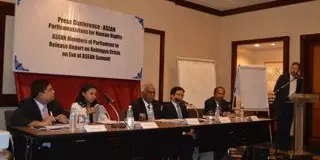
Parliamentarians call on ASEAN leaders to address the Rohingya crisis and the escalating risk of atrocity crimes in Myanmar
April 11, 2015

KUALA LUMPUR — ASEAN leaders must urgently respond to the escalating crisis situation for Rohingya Muslims and other vulnerable minorities in Myanmar, ASEAN Parliamentarians for Human Rights (APHR) said today in a public call on regional governments on the eve of the 26th ASEAN Summit.
In an open letter to ASEAN heads of state, the collective of parliamentarians called for greater recognition of the serious threat the continued persecution of the Rohingya minority represents not only to Myanmar, but to all of ASEAN. APHR also called for an independent investigation into the growing crisis and the deployment of ASEAN monitors in the lead up to elections scheduled for later this year.
“The growing risk of atrocity crimes in Myanmar represents a direct threat to ASEAN nations, both because of the security risks and economic strains it poses for all ASEAN member states, and because it undermines our shared commitment to protecting all people from persecution and violence,” said Charles Santiago, APHR’s Chairperson and a member of the Malaysian Parliament.
“We are standing on the precipice of a great tragedy. ASEAN as a grouping as well as individual national leaders have the responsibility, both morally and under international law, to act to prevent atrocity crimes and crimes against humanity from taking place.”
APHR MPs travelled in early April to Myanmar to see the situation first hand and were alarmed by the proliferation of hate speech and extremist language that the state is turning a blind eye to.
The findings of that mission, combined with further long-term independent research by established human rights organizations, were compiled into the APHR report, The Rohingya Crisis and the Risk of Atrocities in Myanmar: An ASEAN Challenge and Call to Action, released today. The report highlights the deteriorating situation for Myanmar’s already vulnerable minorities and the escalating risk of atrocity crimes.
“Our delegation identified several troubling signs of anti-Muslim rhetoric and broader incitement to violence, which are likely to increase in the lead up to elections,” the parliamentarians wrote in their open letter to ASEAN leaders.
“There is no possible conclusion other than that the Myanmar government is at best allowing and at worst encouraging this very dangerous and systematic persecution of Rohingya and other religious and ethnic minorities, in direct contravention of international human rights laws,” Santiago added.
APHR’s report analyzes current dynamics based on indicators included in the UN Framework for Analysis of Atrocity Crimes, including specific indicators of the risk of war crimes, crimes against humanity, and genocide.
Among the indicators in the case of Myanmar is the intense discrimination and persecution of Rohingya. As the report details, Rohingya face severe restrictions on all aspects of daily life in their native Rakhine State. Tens of thousands still live in IDP camps more than two years after deadly inter-communal violence, and thousands more have fled by sea—often at the mercy of human traffickers.
U Shwe Maung, a Rohingya member of Myanmar’s parliament, declared that, “the situation is already dire, and I fear what is coming may be much worse. The unwillingness of many in Myanmar to even recognize the word ‘Rohingya’ is particularly troubling.”
The report also highlights concerning indicators for other minority populations in the country, including widening anti-Muslim sentiment throughout Myanmar and persistent human rights abuses perpetrated by the Myanmar Army with impunity against ethnic minority groups in Kachin and northern Shan States.
The report and open letter represent a collective call to action for ASEAN leaders to prioritize the issue at the upcoming ASEAN Summit and future meetings and to take other measures to combat the crisis.
“ASEAN’s leaders have a role to play in mitigating the risk of atrocity crimes in Myanmar,” said Irine Yusiana Roba, a member of parliament from Indonesia. “Working through existing regional mechanisms, including the ASEAN Intergovernmental Commission on Human Rights, they can strengthen their response. But it must begin with a recognition that the issue impacts all of us and deserves to be prioritized.”
In appreciation of the need for a coordinated international response, the co-chairs of the U.S. House of Representatives’ Human Rights Commission sent a letter to APHR congratulating its members on the report’s release and expressing interest in working with them to address the crisis facing Rohingya in Myanmar.
As the report concludes: “APHR will remain focused on the escalating crisis and determined to draw the attention and action of ASEAN’s leaders.” Parliamentarians are committed to continuing their push for action, working with allies around the globe, including members of the U.S. Congress, to secure a robust response to the crisis.
To read the report, click here.
ASEAN Parliamentarians for Human Rights (APHR) was founded in June 2013 with the objective of promoting democracy and human rights across Southeast Asia. Our founding members include many of the region's most progressive Members of Parliament (MPs), with a proven track record of human rights advocacy work.